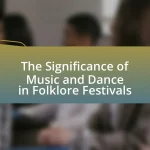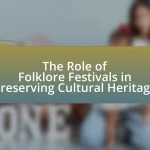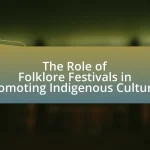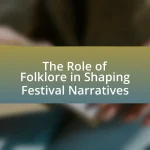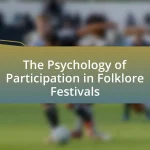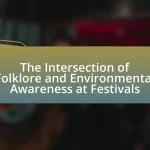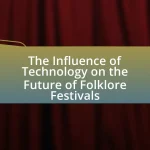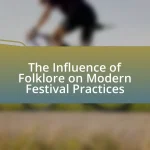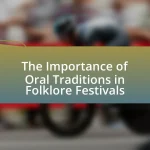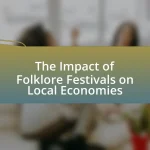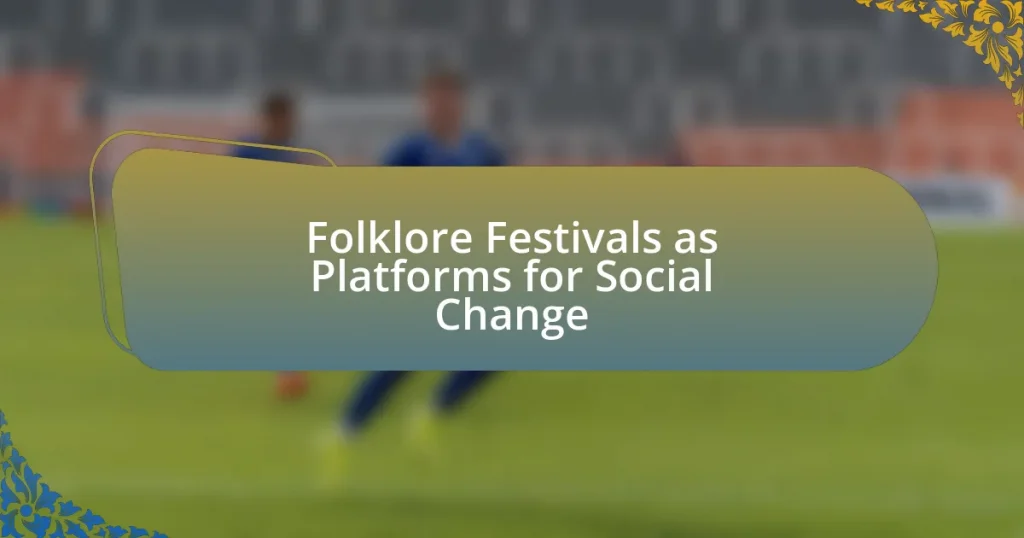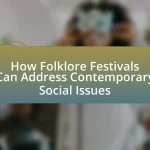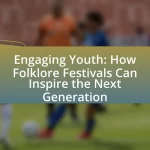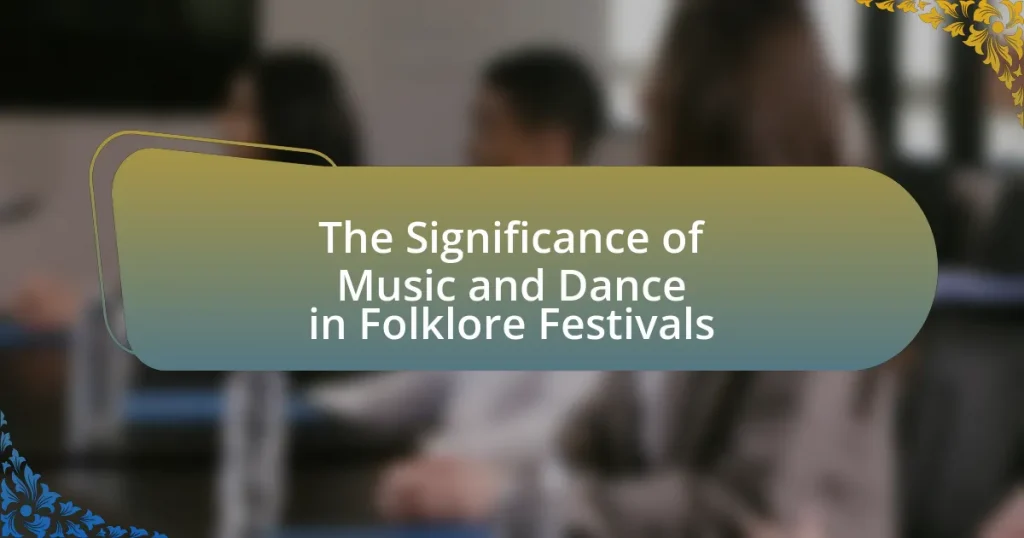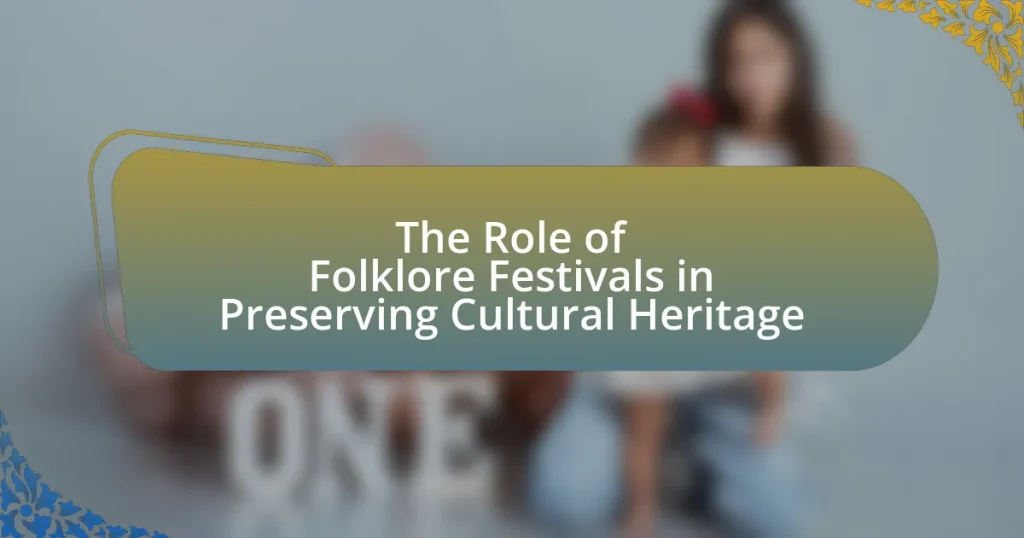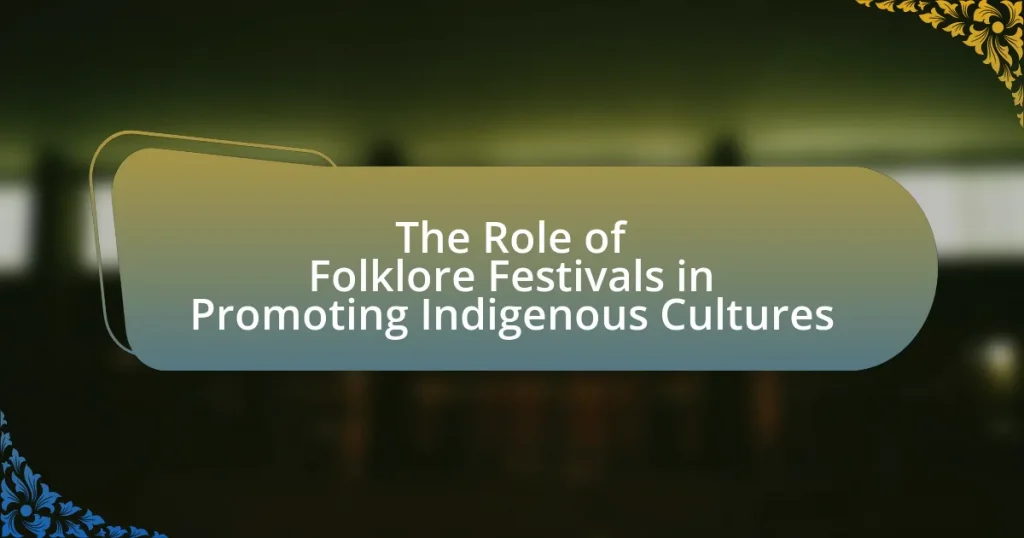Folklore festivals are cultural events that celebrate traditional customs, music, dance, and storytelling, serving as vital platforms for preserving cultural identity and fostering community cohesion. These festivals reflect cultural identity by showcasing unique practices and narratives, while also promoting social change by addressing issues such as cultural preservation, environmental sustainability, and social justice. Local communities play a crucial role in organizing these events, which enhance social ties and empower marginalized voices. The article explores the significance of folklore festivals in promoting cultural awareness, community engagement, and social change, as well as the challenges and opportunities they present in achieving these goals.
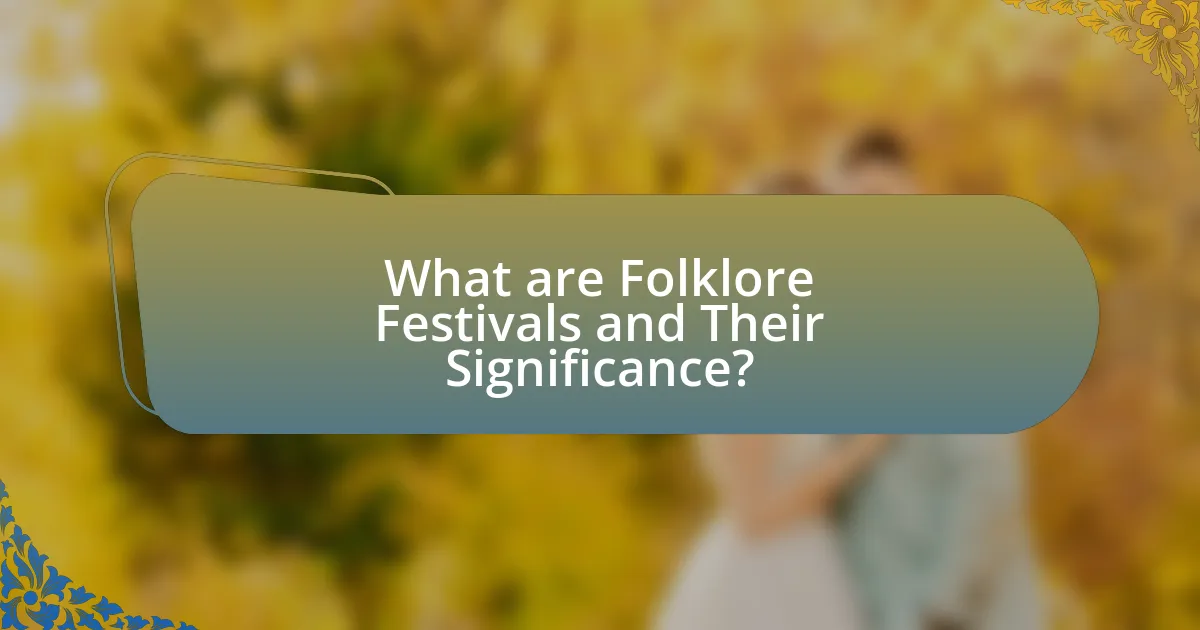
What are Folklore Festivals and Their Significance?
Folklore festivals are cultural events that celebrate traditional customs, music, dance, and storytelling, often reflecting the heritage of a specific community or region. These festivals serve as vital platforms for preserving cultural identity, fostering community cohesion, and promoting social change by bringing together diverse groups to share and appreciate their unique traditions. For instance, the Smithsonian Folklife Festival in the United States showcases various cultural expressions, highlighting the importance of cultural diversity and social dialogue. Such events not only entertain but also educate participants and audiences about the significance of cultural heritage, thereby reinforcing social bonds and encouraging mutual respect among different communities.
How do Folklore Festivals reflect cultural identity?
Folklore festivals reflect cultural identity by showcasing traditional practices, music, dance, and storytelling that are integral to a community’s heritage. These festivals serve as a platform for communities to express their unique cultural narratives, reinforcing shared values and collective memory. For instance, the Smithsonian Folklife Festival in the United States highlights diverse cultural expressions, allowing participants to engage with and celebrate their cultural roots. This engagement fosters a sense of belonging and pride among community members, while also educating broader audiences about the significance of these cultural practices.
What elements of culture are showcased in Folklore Festivals?
Folklore festivals showcase various elements of culture, including traditional music, dance, crafts, storytelling, and culinary practices. These festivals serve as a platform for communities to express their cultural heritage and identity, often featuring performances that highlight regional folklore and historical narratives. For instance, traditional music and dance forms, such as folk songs and regional dances, are integral to these festivals, reflecting the unique rhythms and styles of different cultures. Additionally, crafts displayed at these events often include handmade items that represent local artistry and techniques passed down through generations. The storytelling aspect emphasizes oral traditions, preserving myths and legends that are vital to cultural continuity. Culinary practices featured at folklore festivals allow for the sharing of traditional recipes and food preparation methods, further enriching the cultural experience.
How do these festivals promote cultural preservation?
Festivals promote cultural preservation by serving as vibrant platforms for the expression and transmission of traditional practices, languages, and art forms. These events often feature performances, workshops, and exhibitions that showcase local customs and heritage, allowing communities to engage with their cultural identity actively. For instance, the Smithsonian Folklife Festival in the United States highlights diverse cultural traditions, fostering appreciation and understanding among participants and audiences. This engagement not only reinforces community bonds but also ensures that younger generations learn and value their cultural heritage, thereby contributing to its ongoing preservation.
Why are Folklore Festivals important for community engagement?
Folklore festivals are important for community engagement because they foster cultural identity and social cohesion among participants. These festivals provide a platform for individuals to share and celebrate their traditions, which enhances community pride and belonging. Research indicates that events like folklore festivals can increase social interaction and collaboration, leading to stronger community ties. For instance, a study by the National Endowment for the Arts found that cultural events significantly boost local economies and encourage community participation, demonstrating their role in enhancing civic engagement and collective identity.
What role do local communities play in organizing these festivals?
Local communities play a crucial role in organizing folklore festivals by actively participating in the planning, execution, and promotion of these events. They contribute local knowledge, cultural traditions, and resources, ensuring that the festivals authentically represent their heritage. For instance, community members often form committees to coordinate logistics, secure funding, and engage local artists and performers, which fosters a sense of ownership and pride. Studies have shown that festivals organized by local communities can enhance social cohesion and promote cultural identity, as evidenced by the success of events like the National Folk Festival in Australia, which highlights regional traditions and attracts significant local involvement.
How do Folklore Festivals foster social cohesion?
Folklore festivals foster social cohesion by bringing diverse community members together to celebrate shared cultural heritage. These events create a sense of belonging and mutual understanding among participants, as they engage in traditional music, dance, and storytelling that reflect their collective identity. Research indicates that such gatherings enhance social networks and promote inclusivity, as evidenced by studies showing increased community participation and collaboration in local initiatives following festival events. By facilitating interactions across different social groups, folklore festivals strengthen community ties and contribute to a more cohesive society.
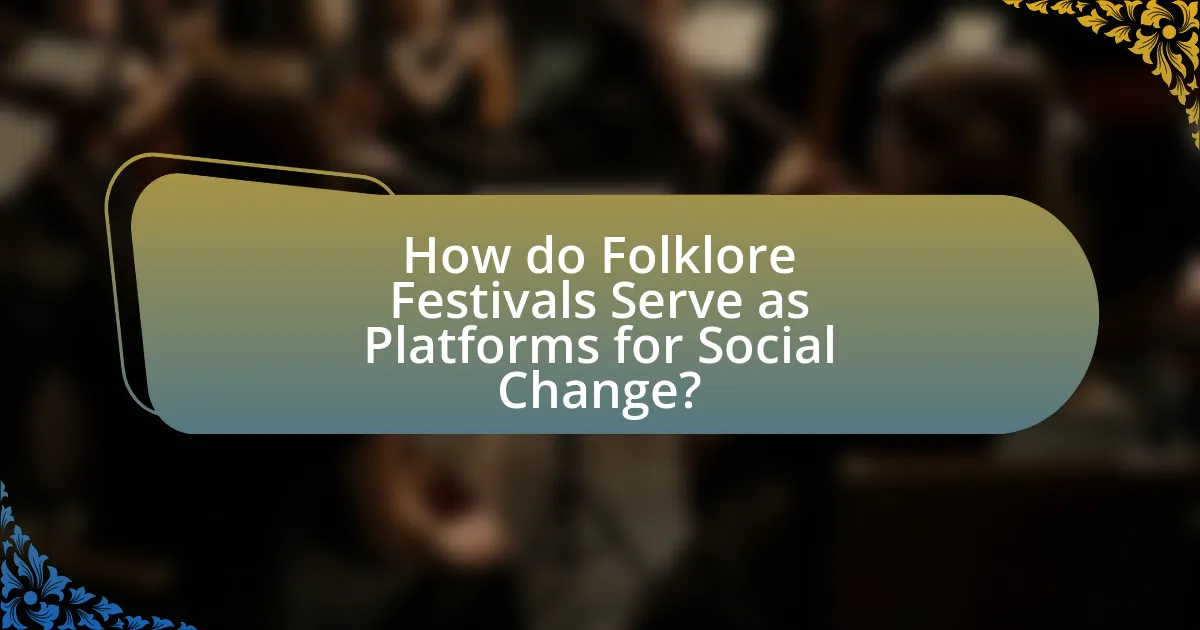
How do Folklore Festivals Serve as Platforms for Social Change?
Folklore festivals serve as platforms for social change by promoting cultural awareness and community engagement. These festivals often highlight traditional practices, stories, and art forms that reflect the values and struggles of specific communities, fostering a sense of identity and belonging. For instance, the Smithsonian Folklife Festival showcases diverse cultural expressions, encouraging dialogue about social issues such as immigration and environmental sustainability. By bringing together various groups, folklore festivals can challenge stereotypes and promote inclusivity, as evidenced by events like the National Folk Festival, which emphasizes the importance of cultural heritage in addressing contemporary social challenges.
In what ways can Folklore Festivals address social issues?
Folklore festivals can address social issues by promoting cultural awareness, fostering community cohesion, and providing a platform for marginalized voices. These festivals often celebrate diverse traditions and practices, which can educate attendees about different cultures and the social challenges they face. For instance, festivals that highlight indigenous cultures can raise awareness about issues such as land rights and cultural preservation. Additionally, folklore festivals can serve as a gathering space for community members to engage in dialogue about social justice, thereby strengthening social bonds and encouraging collective action. Research indicates that events like the Smithsonian Folklife Festival have successfully highlighted social issues, leading to increased advocacy and community engagement.
What specific social issues are often highlighted at these festivals?
Folklore festivals often highlight social issues such as cultural preservation, environmental sustainability, and social justice. Cultural preservation is emphasized as these festivals celebrate and promote traditional practices and heritage, ensuring that they are passed down through generations. Environmental sustainability is addressed through initiatives that raise awareness about ecological issues, encouraging communities to adopt sustainable practices. Social justice is spotlighted by advocating for marginalized groups, promoting inclusivity, and addressing inequalities within society. These themes are evident in various festival programs and activities, which aim to engage attendees in meaningful discussions and actions related to these pressing social concerns.
How do festival activities promote awareness and advocacy?
Festival activities promote awareness and advocacy by creating immersive experiences that engage participants with social issues. These events often feature workshops, performances, and discussions that highlight cultural narratives and community challenges, fostering a deeper understanding among attendees. For instance, festivals like the National Folk Festival in Australia incorporate local Indigenous stories and issues, raising awareness about cultural preservation and social justice. This engagement not only educates the public but also mobilizes community action, as evidenced by increased participation in advocacy initiatives following such events.
What impact do Folklore Festivals have on marginalized communities?
Folklore festivals significantly empower marginalized communities by providing a platform for cultural expression and social visibility. These festivals allow underrepresented groups to showcase their traditions, arts, and narratives, fostering a sense of pride and identity. For instance, research indicates that participation in folklore festivals can enhance community cohesion and resilience, as seen in the case of the National Folk Festival in the United States, which highlights diverse cultural heritages and promotes inclusivity. Additionally, folklore festivals can stimulate local economies by attracting tourism, thereby creating job opportunities and supporting local artisans. This economic boost further enables marginalized communities to sustain their cultural practices and advocate for their rights.
How do these festivals empower underrepresented voices?
Folklore festivals empower underrepresented voices by providing a platform for marginalized communities to showcase their cultural heritage and narratives. These festivals often prioritize the inclusion of diverse artists and performers, allowing them to share their stories and traditions, which may otherwise be overlooked in mainstream media. For instance, festivals like the Smithsonian Folklife Festival have featured indigenous and immigrant communities, highlighting their unique contributions to cultural diversity. This representation fosters greater visibility and understanding, enabling these voices to influence social change and challenge stereotypes.
What examples exist of successful social change initiatives stemming from Folklore Festivals?
Successful social change initiatives stemming from folklore festivals include the “Festival of American Folklife,” which has promoted cultural diversity and community engagement since its inception in 1976. This festival, organized by the Smithsonian Institution, showcases traditional arts and crafts, fostering appreciation for various cultures and encouraging dialogue among diverse communities. Another example is the “International Folklore Festival” in Romania, which has facilitated the preservation of local traditions while addressing social issues such as rural poverty and youth unemployment through workshops and cultural exchanges. These initiatives demonstrate how folklore festivals can serve as catalysts for social awareness and community development.
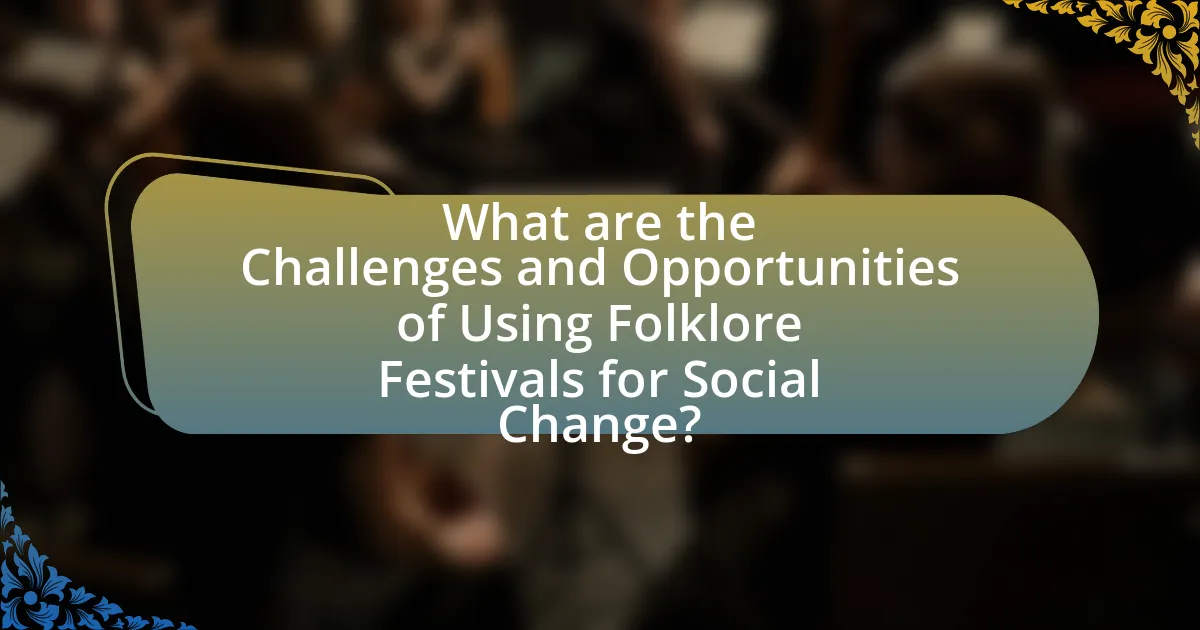
What are the Challenges and Opportunities of Using Folklore Festivals for Social Change?
Folklore festivals present both challenges and opportunities for social change. The challenges include potential cultural appropriation, where dominant cultures may exploit marginalized traditions, leading to misrepresentation and loss of authenticity. Additionally, logistical issues such as funding, community engagement, and ensuring inclusivity can hinder the effectiveness of these festivals in promoting social change.
Conversely, opportunities arise from the ability of folklore festivals to foster community cohesion, celebrate cultural heritage, and raise awareness about social issues. For instance, festivals can serve as platforms for marginalized voices, allowing them to share their stories and advocate for change. Research indicates that events like the Smithsonian Folklife Festival have successfully highlighted social justice themes, engaging diverse audiences and promoting dialogue around critical issues. Thus, while challenges exist, the potential for folklore festivals to drive social change is significant when approached thoughtfully.
What challenges do organizers face in promoting social change through festivals?
Organizers face several challenges in promoting social change through festivals, including funding limitations, community engagement, and balancing diverse stakeholder interests. Funding limitations often restrict the scale and scope of initiatives, making it difficult to implement impactful programs. Community engagement is crucial, as organizers must effectively connect with local populations to ensure participation and support; however, apathy or resistance can hinder these efforts. Additionally, balancing the interests of various stakeholders, such as sponsors, local governments, and community groups, can create conflicts that complicate the festival’s objectives. These challenges are documented in studies highlighting the complexities of organizing events aimed at social change, such as the research conducted by the University of California, which emphasizes the importance of addressing these barriers for successful outcomes.
How can funding and resources affect the success of these initiatives?
Funding and resources significantly influence the success of folklore festivals as platforms for social change by enabling comprehensive planning, execution, and outreach. Adequate financial support allows organizers to secure venues, hire skilled personnel, and promote events effectively, which enhances participation and community engagement. For instance, a study by the National Endowment for the Arts found that festivals with robust funding attracted 30% more attendees, leading to greater cultural exchange and awareness. Additionally, resources such as partnerships with local businesses and access to technology can amplify the festival’s impact, fostering a more inclusive environment that promotes social dialogue and community cohesion.
What barriers exist in engaging diverse audiences at Folklore Festivals?
Barriers that exist in engaging diverse audiences at folklore festivals include cultural misunderstandings, accessibility issues, and marketing limitations. Cultural misunderstandings can arise when festival programming does not reflect the values or traditions of various communities, leading to feelings of exclusion. Accessibility issues, such as transportation, physical barriers, and financial constraints, can prevent participation from marginalized groups. Additionally, marketing limitations often fail to reach diverse audiences due to a lack of targeted outreach or representation in promotional materials, which can result in low attendance from underrepresented communities. These barriers collectively hinder the potential of folklore festivals to serve as inclusive platforms for social change.
What opportunities can be leveraged for greater impact?
Folklore festivals can leverage community engagement, cultural exchange, and educational initiatives for greater impact. By actively involving local communities in the planning and execution of festivals, organizers can foster a sense of ownership and pride, which enhances social cohesion. Cultural exchange opportunities allow diverse groups to share their traditions, promoting understanding and tolerance among different cultures. Educational initiatives, such as workshops and discussions during festivals, can raise awareness about social issues, encouraging attendees to take action. For instance, the National Folk Festival in the United States has successfully utilized these strategies to promote cultural heritage while addressing contemporary social issues, demonstrating the potential of folklore festivals as catalysts for social change.
How can partnerships with NGOs enhance the effectiveness of Folklore Festivals?
Partnerships with NGOs can enhance the effectiveness of Folklore Festivals by providing resources, expertise, and community engagement that amplify the festival’s impact. NGOs often have established networks and experience in cultural preservation, which can help in curating authentic programming that resonates with diverse audiences. For instance, NGOs can facilitate workshops and educational sessions that promote cultural understanding and social issues relevant to the community, thereby enriching the festival experience. Additionally, collaboration with NGOs can attract funding and sponsorships, enabling the festival to expand its reach and improve logistical aspects. Evidence of this can be seen in festivals that have successfully partnered with NGOs to address social issues, such as environmental sustainability or cultural heritage, leading to increased attendance and community involvement.
What strategies can be implemented to maximize community involvement?
To maximize community involvement in folklore festivals, organizers can implement strategies such as inclusive planning, targeted outreach, and interactive programming. Inclusive planning involves engaging diverse community members in the decision-making process, ensuring that various cultural perspectives are represented. Targeted outreach can be achieved through partnerships with local organizations, schools, and cultural groups, which helps to attract a wider audience and encourages participation from underrepresented communities. Interactive programming, such as workshops, performances, and hands-on activities, fosters engagement and allows attendees to actively participate rather than just observe. These strategies have been shown to enhance community ownership and investment in events, leading to increased attendance and participation, as evidenced by successful case studies in various cultural festivals across the United States.
What best practices can be adopted for organizing impactful Folklore Festivals?
To organize impactful Folklore Festivals, it is essential to prioritize community engagement, cultural authenticity, and sustainable practices. Engaging local communities ensures that the festival reflects their traditions and values, fostering a sense of ownership and pride. Cultural authenticity can be maintained by involving local artists and performers who represent the true essence of the folklore being celebrated. Sustainable practices, such as minimizing waste and promoting local businesses, enhance the festival’s positive impact on the environment and economy. Research indicates that festivals that incorporate these elements not only attract larger audiences but also contribute to social cohesion and cultural preservation, as seen in the success of the Smithsonian Folklife Festival, which emphasizes community participation and cultural representation.
